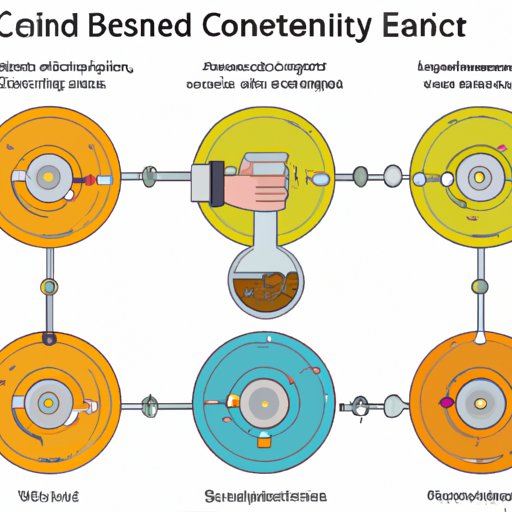Introduction
Experiment control is an essential part of any scientific research project. It involves establishing a group of subjects that are not exposed to the experimental treatment, allowing researchers to compare the results between the two groups and determine the effects of the treatment. This article will provide an overview of what experiment control is and how it can be used to improve the quality and accuracy of research findings.

Explaining the Basics of Experiment Control
Before diving into the specifics of experiment control, it is important to understand the basics. Experiment control refers to the process of establishing a control group of subjects that are not exposed to the experimental treatment. This allows researchers to compare the results between the two groups and accurately measure the effects of the treatment.
The primary purpose of experiment control is to minimize the possibility of bias or confounding variables. A bias is an error in the design or execution of a study that results in inaccurate or misleading results. Confounding variables are factors that might influence the results of the experiment and should be controlled for in order to obtain reliable results.
Examining Different Types of Experiment Controls
There are several different types of experiment control that can be used in scientific research. The most commonly used types are randomized control trials, blind control experiments, and placebo control experiments.
Randomized Control Trials: Randomized control trials involve randomly assigning subjects to either the experimental group or the control group. This ensures that the two groups are similar in terms of characteristics such as age, gender, and health status. This type of control is often used in clinical trials to test the efficacy of new drugs or treatments.
Blind Control Experiments: Blind control experiments involve keeping the experimenter unaware of which subjects are in the experimental group and which are in the control group. This helps to prevent any potential bias from influencing the results of the experiment.
Placebo Control Experiments: Placebo control experiments involve giving one group of subjects a placebo (an inactive substance) instead of the actual treatment being tested. This allows researchers to compare the results between the two groups and determine the true effects of the treatment.

Analyzing the Role of Experiment Control in Scientific Research
Experiment control plays an important role in scientific research by enhancing the quality and accuracy of data. By controlling for potential sources of bias and confounding variables, researchers can ensure that their results are as accurate as possible. Additionally, experiment control helps to increase the reproducibility and reliability of research findings, making them more likely to be accepted by the scientific community.
Investigating the Benefits of Experiment Control
In addition to improving the quality and accuracy of data, experiment control has several other benefits. One benefit is that it improves understanding of research findings by providing a clear comparison between the experimental group and the control group. This allows researchers to draw more accurate conclusions about the effects of the treatment.
Experiment control also reduces the risk of false positives, which are results that appear to be significant but are actually due to random chance. By controlling for potential sources of bias and confounding variables, researchers can reduce the likelihood of false positives and increase the validity of their results.
Finally, experiment control can help to enhance the credibility of research findings. By using rigorous methods to control for potential sources of bias, researchers can demonstrate that their results are trustworthy and valid.
Discussing How to Properly Implement an Experiment Control
Implementing an effective experiment control requires careful planning and consideration. First, researchers must identify the type of control needed for their study. Depending on the type of study, different controls may be necessary. For example, a randomized control trial may be necessary for a clinical trial, while a blind control experiment may be necessary for an observational study.
Once the type of control has been identified, researchers must then establish appropriate parameters. This includes determining the size of the control group, selecting the subjects to be included in the group, and establishing the criteria for inclusion and exclusion. Finally, researchers must assign the subjects to the control group, ensuring that they are randomly assigned and that the group is balanced in terms of characteristics such as age, gender, and health status.

Illustrating the Impact of Experiment Control on Data Quality and Accuracy
To illustrate the impact of experiment control on data quality and accuracy, let’s consider an example. Suppose that a researcher is conducting a study to determine the effects of a new drug on blood pressure. Without an experiment control, the researcher would not be able to accurately assess the effects of the drug because there would be no way to compare the results between the experimental group and the control group. However, if the researcher were to implement an experiment control, such as a randomized control trial, then they would be able to accurately measure the effects of the drug.
By examining this example, we can see that experiment control is essential for obtaining accurate and reliable results. Without an experiment control, it would be impossible to accurately measure the effects of the treatment. Therefore, experiment control is an essential component of any scientific research project.
Conclusion
In conclusion, experiment control is an essential part of any scientific research project. It helps to minimize bias and confounding variables, enhance the quality and accuracy of data, and increase the reproducibility and reliability of research findings. Additionally, it can reduce the risk of false positives and improve understanding of research findings. Therefore, experiment control is essential for obtaining reliable and valid results.
(Note: Is this article not meeting your expectations? Do you have knowledge or insights to share? Unlock new opportunities and expand your reach by joining our authors team. Click Registration to join us and share your expertise with our readers.)
